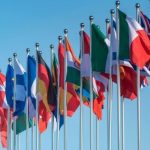 Crime
Crime  Crime
Crime  Animals
Animals The Animal Kingdom’s 10 Greatest Dance Moves
 Movies and TV
Movies and TV 10 Box Office Bombs That We Should Have Predicted in 2025
 History
History 10 Extreme Laws That Tried to Engineer Society
 History
History 10 “Modern” Problems with Surprising Historical Analogs
 Health
Health 10 Everyday Activities That Secretly Alter Consciousness
 History
History Top 10 Historical Disasters Caused by Someone Calling in Sick
 Animals
Animals 10 New Shark Secrets That Recently Dropped
 Movies and TV
Movies and TV 10 Forgotten Realities of Early Live Television Broadcasts
 Technology
Technology 10 Stopgap Technologies That Became Industry Standards
 Crime
Crime 10 Dark Details of the “Bodies in the Barrels” Murders
 Animals
Animals The Animal Kingdom’s 10 Greatest Dance Moves
 Movies and TV
Movies and TV 10 Box Office Bombs That We Should Have Predicted in 2025
Who's Behind Listverse?

Jamie Frater
Head Editor
Jamie founded Listverse due to an insatiable desire to share fascinating, obscure, and bizarre facts. He has been a guest speaker on numerous national radio and television stations and is a five time published author.
More About Us History
History 10 Extreme Laws That Tried to Engineer Society
 History
History 10 “Modern” Problems with Surprising Historical Analogs
 Health
Health 10 Everyday Activities That Secretly Alter Consciousness
 History
History Top 10 Historical Disasters Caused by Someone Calling in Sick
 Animals
Animals 10 New Shark Secrets That Recently Dropped
 Movies and TV
Movies and TV 10 Forgotten Realities of Early Live Television Broadcasts
 Technology
Technology 10 Stopgap Technologies That Became Industry Standards
10 People Who Secretly Controlled Countries Without a Title
Forget the official titles and enshrined leaders. True power often hides in the shadows, far from the public eye. Throughout history, countless individuals have secretly steered nations, dictating policy and manipulating empires. These “shadow rulers” operated without a single, legitimate title. They leveraged unparalleled trust, shrewd political savvy, or even dark influence to control entire countries. Their power was absolute, their decisions often irreversible. Discover the hidden figures who truly pulled the strings of history.
Related: 10 Political Prisoners Who Went On to Become Leaders
10 Edith Bolling Galt Wilson
While Woodrow Wilson served as the 28th president of the United States, his second wife, Edith Bolling Galt Wilson, famously became known as the “first female president” without ever holding the title. This extraordinary unofficial role began in October 1919, when President Wilson suffered a severe stroke that left him partially paralyzed and largely incapacitated. Instead of publicly acknowledging the extent of his illness or resigning, a clandestine operation began to keep the true nature of his condition hidden from the American public and even his own cabinet.
Edith Wilson swiftly stepped into the void, acting as the primary gatekeeper to her ailing husband. She meticulously screened all official communications, determining which documents and decisions were presented to him and, crucially, how they were presented. She reviewed state papers, decided which cabinet meetings were necessary, and often made executive decisions herself, claiming to be merely “assisting” her husband. In essence, she became the de facto chief executive, making critical governmental decisions during a pivotal period following World War I, including vetoing legislation and directing cabinet members—all while maintaining the illusion of a functioning presidency.
Her unprecedented influence lasted for the remaining 17 months of Wilson’s term, an astonishing period when a First Lady effectively ran the executive branch. This period remains one of the most remarkable and controversial instances of undeclared presidential power in American history, raising profound questions about accountability and transparency at the highest levels of government.[1]
9 Grigori Rasputin
In the twilight years of the Russian Empire, the enigmatic figure of Grigori Rasputin, a self-proclaimed holy man and mystic, exerted an astonishing and unprecedented influence over Tsar Nicholas II and, more critically, Tsarina Alexandra. Hailing from Siberia, Rasputin’s power stemmed from his apparent ability to alleviate the suffering of the Tsarevich Alexei, the heir to the throne who suffered from hemophilia. This unique perceived gift, combined with his charismatic and hypnotic personality, granted him an almost unbreakable hold over the devout and desperate Tsarina.
As World War I continued and Nicholas II took personal command of the army at the front, Tsarina Alexandra—isolated and increasingly unpopular—became the de facto ruler in St. Petersburg, relying almost entirely on Rasputin’s “divine” counsel. He effectively dictated appointments and dismissals within the government and the Church, with ministers and high-ranking officials owing their positions—or their downfall—to his whims. His scandalous personal life and perceived control over the royal family severely damaged the monarchy’s already fragile reputation, fueling widespread rumors and resentment among the nobility and public alike.
Rasputin’s shadowy control, exercised without any formal title or position, helped demoralize the Russian government and accelerate the imperial family’s demise. His assassination in December 1916, orchestrated by nobles desperate to save the monarchy, came too late to prevent the collapse of the Romanov dynasty.[2]
8 Cardinal Richelieu
Armand Jean du Plessis, Cardinal-Duc de Richelieu, despite being a cardinal of the Catholic Church, was the principal minister of King Louis XIII of France for nearly two decades, from 1624 until his death in 1642. While he held the title of “chief minister,” his power extended far beyond that of a mere advisor; he was the de facto ruler of France, meticulously shaping domestic and foreign policy and fundamentally altering the course of European history.
Richelieu’s objectives were clear: to consolidate royal power within France by crushing the influence of the Huguenots (French Protestants) and rebellious nobility, and to establish France as Europe’s dominant power by challenging the Habsburg dynasty. He navigated court intrigue with a network of spies and ruthlessly suppressed opposition, executing high-ranking nobles to achieve his goals. His motto, “My first goal was the majesty of the King; my second, the greatness of the kingdom,” encapsulated his priorities.
Through the Thirty Years’ War, he aligned Catholic France with Protestant powers against the Catholic Habsburgs, prioritizing national interest over religious dogma. Richelieu’s influence was so profound that Louis XIII famously remarked, “I allowed him to do everything he wanted,” acknowledging the cardinal’s complete command.[3]
7 Madame de Pompadour
Jeanne Antoinette Poisson, better known as Madame de Pompadour, was the chief mistress of King Louis XV of France from 1745 until she died in 1764. Far more than just a royal consort, Pompadour leveraged her relationship with the king to become an indispensable political advisor and power broker, effectively controlling access to the monarch and influencing critical state decisions without any formal office.
Her intelligence, charm, and deep understanding of court politics allowed her to remain influential even after their romantic relationship ended. She managed the king’s schedule, filtered his information, and participated in nearly all private state discussions. Ambassadors and ministers sought her favor to access the king, making her an unofficial conduit of power. She influenced diplomatic appointments, military strategies, and even policies surrounding the Seven Years’ War.
A patron of the Enlightenment, she supported thinkers like Voltaire and Diderot and commissioned major architectural and artistic projects. Despite never holding office, she became one of the most influential and controversial figures in France—revered for her cultural impact, but blamed by the public for military defeats and economic woes.[4]
6 Imelda Marcos
While Ferdinand Marcos served as President of the Philippines for over two decades, his wife, Imelda Marcos—famous for her opulent lifestyle and vast shoe collection—wielded immense and often unchecked influence far beyond the traditional role of a First Lady. She effectively operated as an unofficial co-ruler, exercising more authority than many top officials.
Imelda held multiple official posts, including Governor of Metro Manila and Minister of Human Settlements. Still, her true power came from her husband’s trust and her personal ambitions. She oversaw massive public works, controlled national industries, and played a key role in foreign diplomacy as her husband’s envoy. Her allies—dubbed “cronies”—gained wealth and influence through her patronage.
After the Marcos regime fell in 1986, evidence emerged of her extensive control and illicit dealings. Imelda’s covert reach across government and business helped shape an era marked by corruption, suppression, and inequality.[5]
5 Deng Xiaoping
After Mao Zedong’s death, Deng Xiaoping became the most powerful figure in China, despite never holding the top titles of President, Premier, or General Secretary during his most influential years. From the late 1970s into the early 1990s, he transformed China’s economy and global position, all while operating largely from behind the scenes.
Deng’s authority came from his revolutionary credentials, party loyalty, and strategic skill. Though he held positions like Chairman of the Central Military Commission and Central Advisory Commission, these roles masked his greater control. He cultivated younger leaders to enact his reforms, maintaining final say on key decisions.
His “reform and opening up” policies—including market reforms and special economic zones—lifted millions out of poverty and propelled China into the modern era. Even after his formal retirement in 1992, Deng’s symbolic “Southern Tour” reaffirmed his agenda, proving that in China’s hierarchy, respect and influence can eclipse official titles.[6]
4 Mamie Doud Eisenhower
While Dwight D. Eisenhower led the Allies to victory in World War II and served two terms as U.S. President, his wife, Mamie Doud Eisenhower, exerted a quieter but meaningful influence. She carefully managed his home life and public image—providing the stability and personal control that enabled him to lead.
Mamie wasn’t involved in policy, but she was a force behind the scenes. She controlled access to Ike, organized his schedule, and protected his time and health—especially during periods of illness. She also influenced personnel through her opinions and social presence; aides who earned her trust often earned her husband’s as well.
As First Lady, Mamie embodied 1950s domestic ideals while creating a private world in which the president could operate effectively. Her loyalty and emotional support made her Eisenhower’s most trusted confidante, underscoring how personal relationships can shape national leadership.[7]
3 Anne Boleyn
Anne Boleyn’s brief tenure as Queen Consort (1533–1536) had seismic consequences for England’s political and religious future. Though officially just the king’s wife, she played a pivotal behind-the-scenes role in breaking England from the Catholic Church and founding the Church of England.
Anne’s wit, ambition, and reformist leanings captivated King Henry VIII. She became a key influence in pushing him toward an annulment from Catherine of Aragon and separation from papal authority. She championed Protestant thinkers, helped place reformers in high office, and had a hand in shaping ecclesiastical policy.
Her power as a queen without formal authority was extraordinary—and dangerous. Once her failure to bear a male heir weakened her position, enemies turned on her. Anne was executed on dubious charges, a brutal end for one of history’s most influential—and short-lived—shadow rulers.[8]
2 Empress Dowager Cixi
From 1861 until her death in 1908, Empress Dowager Cixi ruled China from behind the curtain—literally and figuratively. Though she never claimed the title of Empress Regnant, Cixi controlled the Qing dynasty through a mix of political cunning, strategic regencies, and sheer will.
Cixi began as a low-ranking concubine but rose to power as mother to the emperor. She ruled as regent for her son and later her nephew, orchestrating purges, alliances, and appointments to solidify her grip. Though she observed traditions like speaking from behind a silk screen, her decisions shaped domestic and foreign policy.
Her legacy is mixed: she modernized China’s military and diplomacy while also resisting reforms, contributing to unrest like the Boxer Rebellion. Regardless, Cixi’s near 50-year reign as an unofficial ruler left an indelible mark on Chinese history.[9]
1 Karl Rove
While George W. Bush sat in the Oval Office, Karl Rove—his senior advisor and deputy chief of staff—was often described as “Bush’s Brain.” Rove wielded enormous influence over political strategy, messaging, and domestic policy, all without ever holding a cabinet-level position.
He masterminded both of Bush’s election victories. He helped shape the administration’s approach to everything from tax cuts to education and foreign policy. His direct access to the president and deep understanding of media and electoral mechanics made him more powerful than many formal advisers.
Rove was the GOP’s behind-the-scenes operator—crafting narratives, directing outreach, and managing crises. His influence demonstrated how modern governments can be quietly steered not by those in the spotlight, but by the strategist in the shadows.[10]








